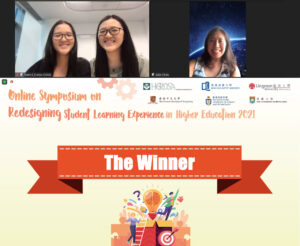e-News
Side story: HKU Med Student-Teacher Partnership Projects won in the Redesigning Student Learning Experience in Higher Education (RSLEIHE) Project Award Scheme 2021
Side story: HKU Med Student-Teacher Partnership Projects won in the Redesigning Student Learning Experience in Higher Education (RSLEIHE) Project Award Scheme 2021
HKU Medicine seized the winner of the Redesigning Student Learning Experience in Higher Education (RSLEIHE) Project Award Scheme 2021, organised by HERDSA Hong Kong Branch. Altogether, 17 projects were shortlisted for the scheme where teams from HKU Med received a number of awards at the symposium organized on 26 June 2021.
| Prize | Project | Awardees |
| Winner & The People’s Choice Award | Students as Educators: Pedagogical innovation through a Student-Driven Near-peer Teaching (NPT) Initiative for Medical Students | Vernice Chan (MBBS 5)
Evelyn Chan (MBBS 5) Teacher advisor: Dr Julie Chen (Department of Family Medicine and Primary Care) |
| First Runner-up | Gamification of Empathy Learning in Medical Education | Tsui Ming Yan Serena (MBBS 3)
Tang Fong Yi Fanny (MBBS3) Teacher advisor: Dr Julie Chen (Department of Family Medicine and Primary Care) |
| Award of Merits | Trans-forMEr – Training for Future Human Relations Leaders in Healthcare Profession
|
Li Hei Long (MBBS 3)
Li Pui Yi (Nursing 1) Siu Tsz Kar (Nursing 1) Asif Kainaat (Nursing 3) Fan Sze Lok Zoe (Nursing 3) Go Ming Yeung (Nursing 3) Teacher advisor: Dr Pauline Luk (BIMHSE) |
More information about RSLEIHE: https://chtl.hkbu.edu.hk/herdsa2021/schedule.php?

Students as Educators: Pedagogical innovation through a Student-Driven Near-peer Teaching (NPT) Initiative for Medical Students
Abstract:
Students are an under-recognised resource in addressing both academic and non-academic gaps within formal education, with the ongoing pandemic further increasing demands for initiatives involving students-as-partners. Through a student-driven near-peer teaching (NPT) programme for medical students, this project demonstrated the significant potential for NPT to supplement higher education by: (1) drawing connections between knowledge attained at different stages of higher education, (2) providing opportunities for cross-cohort interactions to enhance support systems for students, and (3) nurturing professional qualities in students. Thus, NPT is an effective pedagogical tool that should be systematically incorporated into higher education programmes.

Gamification of Empathy Learning in Medical Education
Abstract:
Through the use of empathy games, the project targets more patient-centred understanding of diseases that are often neglected by medical students who focus more on the biomedical curricula, forgetting that being a doctor requires both knowledge and care. The games allow players to assimilate into the illness persona, and enabled participants and organisers alike to think critically about illness circumstances and the ways in which invisible factors affect disease. The project demonstrated that even when face-to-face interaction with patients is not possible, gamification, where the player is literally placed into the patient’s shoes, helps to foster a sense of understanding and awareness of the sick role.

Trans-forMEr – Training for Future Human Relations Leaders in Healthcare Profession
Abstract:
The COVID-19 pandemic has created an opportunity for the revolution in healthcare education. Our team initiated the Trans-forMEr program with a focus on social relations, aiming at enhancing students’ social skills for future career and introducing an innovative pedagogical revolution to healthcare education. Workshops and peer support group meetings are the highlights. Students are the curriculum designers, with teachers guiding through the process with their experience and being the learning partner. The encouraging result of the program prompted the initiators to further the program. It is also suggested that such innovative mode of education can be applied to different educational fields.